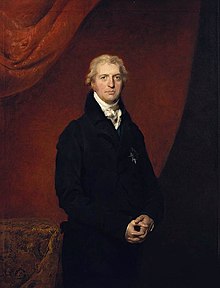The Earl of Liverpool | |
|---|---|
 | |
| Prime Minister of the United Kingdom | |
| In office 8 June 1812 – 9 April 1827 | |
| Monarchs | |
| Regent | George, Prince Regent (1812–1820) |
| Preceded by | Spencer Perceval |
| Succeeded by | George Canning |
| Secretary of State for War and the Colonies | |
| In office 1 November 1809 – 11 June 1812 | |
| Prime Minister | Spencer Perceval |
| Preceded by | The Viscount Castlereagh |
| Succeeded by | The Earl Bathurst |
| Leader of the House of Lords | |
| In office 25 March 1807 – 9 April 1827 | |
| Prime Minister |
|
| Preceded by | The Lord Grenville |
| Succeeded by | The Viscount Goderich |
| In office 17 August 1803 – 5 February 1806 | |
| Prime Minister | |
| Preceded by | The Lord Pelham |
| Succeeded by | The Lord Grenville |
| Home Secretary | |
| In office 25 March 1807 – 1 November 1809 | |
| Prime Minister | The Duke of Portland |
| Preceded by | The Earl Spencer |
| Succeeded by | Richard Ryder |
| In office 12 May 1804 – 5 February 1806 | |
| Prime Minister | William Pitt the Younger |
| Preceded by | Charles Philip Yorke |
| Succeeded by | The Earl Spencer |
| Foreign Secretary | |
| In office 20 February 1801 – 14 May 1804 | |
| Prime Minister | Henry Addington |
| Preceded by | The Lord Grenville |
| Succeeded by | The Lord Harrowby |
| Personal details | |
| Born | Robert Banks Jenkinson 7 June 1770 London, England |
| Died | 4 December 1828 (aged 58) Kingston upon Thames, Surrey, England |
| Resting place | Hawkesbury Parish Church, Gloucestershire, England |
| Political party | Tory |
| Spouses | |
| Parent | Charles Jenkinson (father) |
| Education | Charterhouse School |
| Alma mater | Christ Church, Oxford |
| Signature | |
Robert Banks Jenkinson, 2nd Earl of Liverpool, KG, PC, FRS (7 June 1770 – 4 December 1828) was a British Tory statesman who served as Prime Minister of the United Kingdom from 1812 to 1827. Before becoming Prime Minister he had been Foreign Secretary, Home Secretary and Secretary of State for War and the Colonies. He held the constituency of Rye from 1790 until his elevation to the House of Lords in 1803, where he was Leader from 1807 to 1827.
Liverpool's fifteen years as Prime Minister saw the end of the Napoleonic Wars followed by a period of unrest and radicalism at home. During the first part of his premiership, repressive measures were taken to restore order at home, the Corn Laws were introduced and income tax was repealed. In the 1820s his leadership became more liberal and the period saw a reform of the criminal law and prisons. Throughout his tenure as Prime Minister, Liverpool sought a compromise over the issue of Catholic emancipation. He resigned following a stroke in February 1827. Important events during Liverpool's premiership included the defeat of Napoleon at the Battle of Waterloo, the Congress of Vienna, the 1812-14 war with America, the Peterloo massacre, the Cato Street Conspiracy and the Queen Caroline affair.
Liverpool, known as Jenkinson until 1803 and as Hawkesbury from 1803 to 1808, was the son of Tory politician Charles Jenkinson, 1st Earl of Liverpool. He was educated at Charterhouse School and Christ Church, Oxford. Twice married, he had no children and the earldom passed to his younger half-brother on his death.